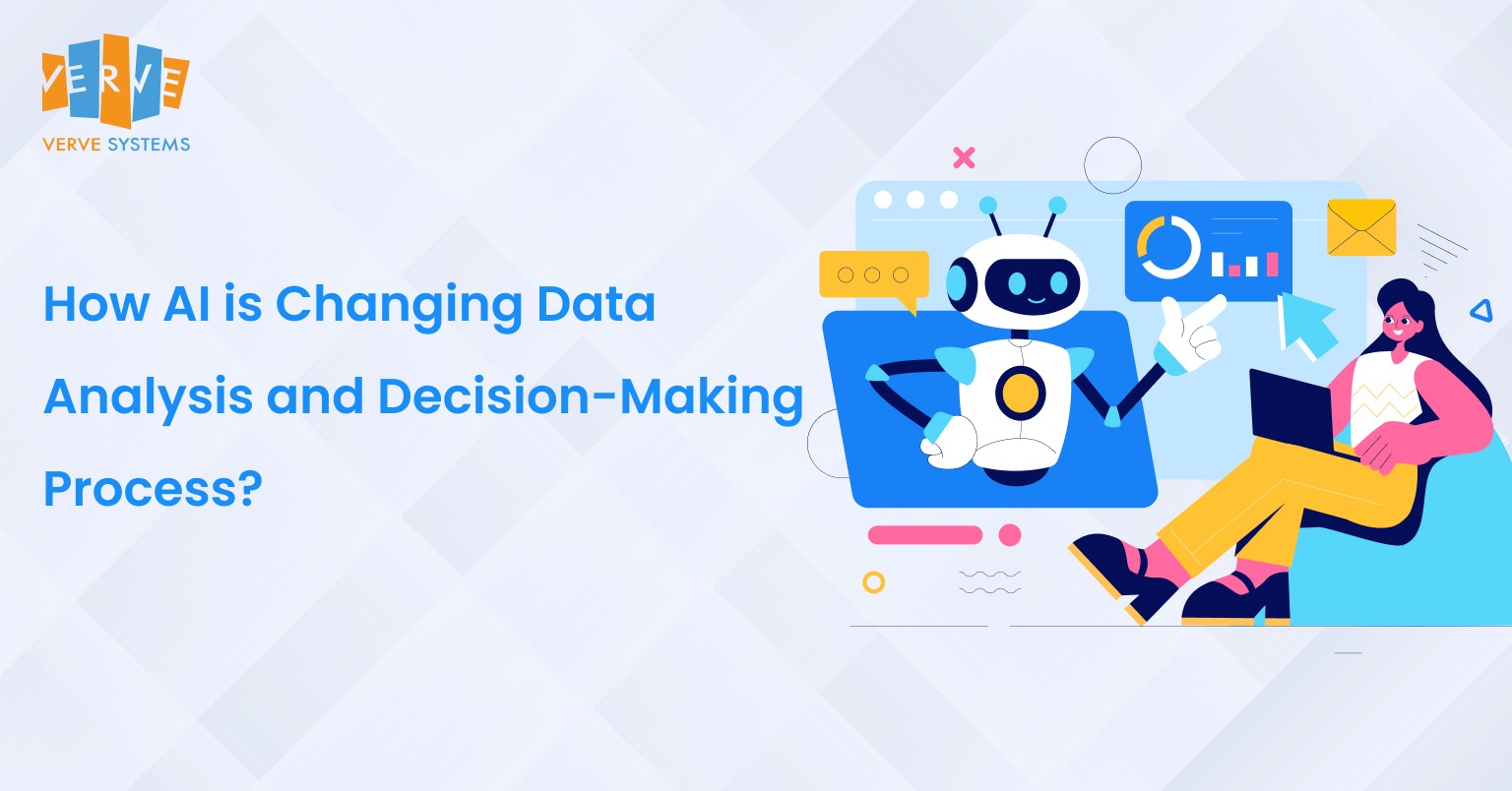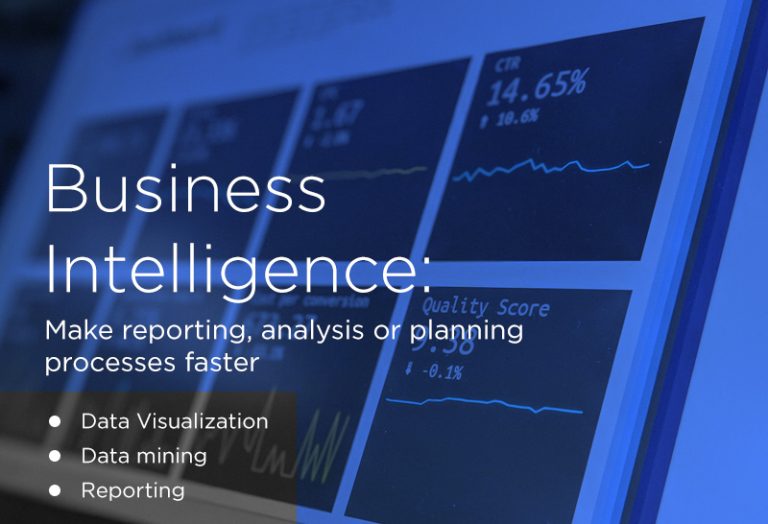Businesses today operate in a data-rich environment. Accessing and having a high volume of data is one of the first challenges in the business environment. The more difficult challenge is deriving actionable intelligence from the data to inform decisions. This is the challenge that Artificial Intelligence (AI) is designed for. More than a trend, AI is a boon for businesses to optimize data analysis and decision-making.
Verve Systems offers a variety of AI services that include Custom AI/ML Solutions, AI Chatbots, Predictive Analytics, and BI (Business Intelligence) Systems. In this piece, I will focus on the AI services offered and the significant ways AI is changing the approach that businesses take in data analysis and decision making, and how best to leverage AI to Optimize Competitive Advantage in business.
Importance of AI in Smarter Decision Making and Data Analysis
If you’ve ever dealt with a lot of data, you know how confusing and overwhelming it can be. We, as businesses, also know that data is always increasing in amount, and trying to keep up with it can be hard. Unfortunately, traditional data analysis techniques are limited. People just aren’t able to analyze that much data in the required time. This is the perfect situation for AI as it can automate the data analysis process and identify insights that are hidden from the human eye.
Key Advantages of AI in Data Analysis
- Enhanced Speed and Efficiency: Businesses can respond more quickly to changes in the market thanks to AI’s ability to analyze large datasets within minutes.
- Increased Precision: Machine learning: can determine and analyze trends and identify patterns that human analysts may miss.
- More Scalability: Businesses don’t need to worry about AI technology reaching a data processing limit.
- Increased Agility: AI enables instantaneous data insights, eliminating the need for lengthy report cycles or meetings before making a business decision.
With AI, modern technology enables data to process and analyze itself, eliminating the problems of human data analysis.
AI’s Role in Decision-Making
Let’s be honest: If the data is ambiguous or difficult to analyze, making a decision can be a daunting task. AI offers fast, clear, data-driven recommendations, and even assists in forecasting.
1. Descriptive Analytics: Understanding What Happened
In AI-powered data analysis, the first step is ‘looking back’ at the data and understanding what occurred in a given timeframe. Imagine a report summarizing your business’s performance in the interval you specified. AI takes on this task automatically, and the result is a quicker, more detailed, and accurate summary than what you might obtain through traditional methods.
2. Diagnostic Analytics: Figuring Out Why It Happened
Now that you know what happened, exploring the ‘why’ is the next step. AI enables you to analyze and assess patterns and relationships in the data. For example, what are the reasons behind a drop in sales in a particular region? AI helps uncover the deeper causative factors, such as changes in customer behavior, pricing, and a host of other reasons.
3. Predictive Analytics: What Might Happen Next?
This is where it gets really exciting. Predictive data AI goes beyond historical analysis by predicting future outcomes. Do you want to know what products are likely to be highly demanded in the future? Forecasting can be conducted using historical data, seasonal patterns, and other data like weather and market fluctuations.
4. Prescriptive Analytics: What Should We Do About It?
This is the phase where AI starts taking action. Predictive AI outcomes and prescriptive AI determine how to respond to those outcomes. For instance, predicting a drop in sales for the next quarter is one thing, but AI prescribes counteractions like proposing a new product and marketing to a previously identified target market to maintain sales levels.
5. Automating Decisions with AI-Powered Chatbots
Decisions can also be automated with AI chatbots. These chatbots have the ability to gather information, analyze it, and make decisions that fall within certain parameters. A common example is a product recommendation based on the customer’s historical purchase data and automated customer support call routing to the appropriate help desk. This streamlines operations and enhances the customer experience.
Practical Applications of AI in Data Analysis and Decision-Making
Here, we will explore some case studies of AI applications in supporting smarter business decisions.
1. Customer Churn Prediction
Predicting which customers will churn is especially critical for subscription-based industries. By examining historical behavior, including the recurrence of purchases and the number of touchpoints in customer support, AI can indicate which customers may become disengaged. Consequently, companies can reach out to customers ahead of time and implement retention initiatives – like personalized offers, discounts, and enhanced support—to reignite their attention.
2. Optimizing Inventory and Supply Chains
Forecasting and managing demand is one of the most challenging and tedious components of inventory management. AI facilitates demand forecasting by incorporating seasonality, historical data, and even social listening analytics. These insights enable businesses to fine-tune inventory, minimizing the risk of excess inventory and out-of-stock scenarios, as well as improving operational efficiency.
3. Personalized Marketing
AI enables firms to send tailored marketing communications. AI-driven analytics of customer data—like website interactions, previous purchases, and social media activity—can support the creation of individualized marketing campaigns for different target audiences. This results in more effective and higher-yielding marketing efforts.
4. Fraud Detection
Fraud detection is especially useful with AI technology in industries such as finance and e-commerce. AI analyzes and processes transaction information in real-time and assesses deviations that could indicate fraudulent transactions. Businesses that utilize AI in transaction monitoring incur low losses from fraud as AI technology helps capture fraud in its early stages.
5. HR and Talent Management
AI in human resources (HR) is another emerging area. Businesses can enhance their hiring decisions by leveraging AI technology to examine and evaluate applications, resumes, social media information, and even historical employee performance. Moreover, AI can provide HR departments with insights on existing skill gaps in their teams and assist in targeted training and development.
Best Practices for Implementing AI in Business
Even though AI technology is one of the most powerful technological advancements that businesses can utilize today, companies need to use it in a specific way in order to reach its full potential.
1. Set Clear Business Goals
Aligning AI with business goals is essential. Whether your target is to enhance operational efficiency, streamline processes, or improve customer satisfaction, it is vital to define goals first. This ensures AI is working toward measurable and meaningful results.
2. Invest in High Quality Data
Good AI is built on good data. Before applying AI, ensure your data is clean, reliable, and organized. The quality of your data directly impacts the accuracy and trustworthiness of your AI insights.
3. Maintain the Explainability of AI Systems
AI systems must be explainable. Decision-makers need to understand how a model works to trust its insights. Avoid black-box models—instead, use explainable AI models that clarify the reasoning behind predictions and recommendations.
4. Improve AI Systems with Continuous Monitoring
AI systems are not “set and forget” technology. They must be regularly updated and monitored to remain relevant as the business evolves. Periodic assessments and AI model updates are necessary to maintain performance and adapt to new datasets.
5. Encourage Adoption Across the Organization
Integrating AI into existing workflows requires collaboration and acceptance from all personnel involved in decision-making. Systems should be user-friendly to encourage adoption and consistent usage.
Why Select Verve Systems for Your AI Needs?
Verve Systems specializes in AI integrations that drive business value. Customizations are made for predictive analytics, AI-integrated conversational agents, business intelligence integrations, and other tailored offerings for net business value.
Working with Us
- Customized Offerings: Every business faces unique challenges. We ensure each AI solution is designed to address your specific needs.
- Complete Process Management: Verve Systems: manages every step from consultation to implementation, training, and ongoing support.
- Industry Experience: Our AI experts bring years of experience in machine learning and data analytics to every project.
Fulfilling Your Potential with AI
Fulfilling your potential with AI demands smart and quick decisions built on thorough data analysis. AI provides the clarity needed to make informed decisions.
Verve Systems is ready to customize and streamline your business processes using AI technology. Our strategic AI implementations improve organizational efficiency, foster innovation, and support growth through informed decision-making.















